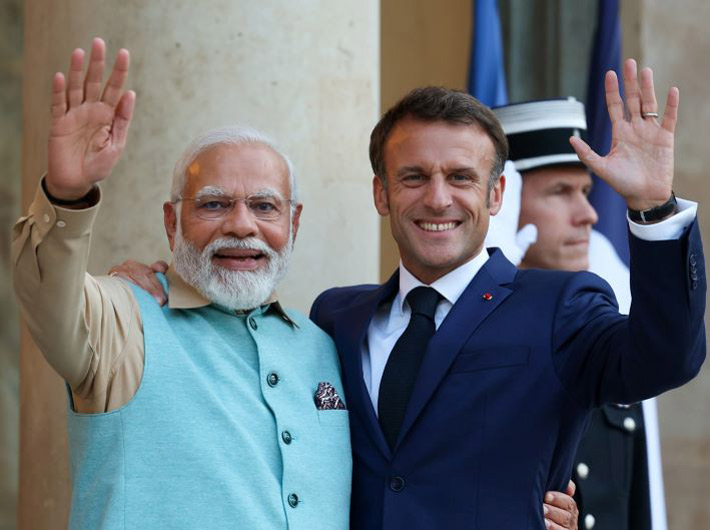PM Modi's successful visit builds on, and adds new facets to, the rich and close ties New Delhi and Paris have enjoyed since 1950
Literature partakes of the glory of courage and chivalry in the French context. Think of D’Artagnan, Arthos, Porthos and Aramis, who are the chief Protagonists of the novel, ‘Three Musketeers’ authored by the legendary writer Alexander Dumas. The three heroes are pitted against the archrival and the alternate centre of power in Champs Elysee, the Cardinal who wants to overturn the seat of power of the French king. This leads to a slugfest in the Parisian capital amounting to classical fencing duels. In the contemporary context, however, prime minister Narendra Modi and the French head of State, Emmanuel Macron, have ounces of respect and faith for each other, where in they have enjoyed a good chemistry beyond routinized summitry.
As France braces itself for an ethnic, racial forest fire in the Urbania and immigrant unrest, India can partner with the French establishment and the much maligned law and order machinery as they happen to face the similar threats and all pervasive challenges to their respective conditionality of internal security. Modi’s visit to France this week can be also construed as a reciprocity exercise as Macron was also invited to be the chief guest of India’s Republic Day celebrations and the Bastille Day celebrations are not an annual affair but the Indian presence is much a matter of glee and honour. Much more than being a confetti strewn event, this visit builds on a rich and close relationship New Delhi and Paris have enjoyed, premised upon cultural and defence exchanges since 1950.
In 1954, India was much pleased to receive the Ouragran fighter jets which were followed by a tranche of Mysters which played a crucial role in the 1965 military exchanges with Pakistan all the way down to the victorious venture of 1971. The Mirages are also of French origin which made life difficult to the Pakistani irregular army intruders in the steely and stealthy heights of Kargil and won the day for the Indian Armed contingents who too sacrificed heroically to drive out the antagonist with crucial air support and accurate firepower on the Pakistani mountain posts.
The present visit aims at a basket of goodies for New Delhi. The Indians side has requested for manufacturing a fighter jet engine for its future multi-role fighter aircraft along with seeking a manufacturing of three Scorpene submarines in the Indian homeland and as of now India already operates six Scorpene class submarines. Along with this phalanx of items of the diplomatic platter, the Make-in-India oeuvre of the New Delhi denomination is seemingly covered in the future and expected military transactions with the Parisians. Along with all this paraphernalia of defence acquisitions being on the anvil, New Delhi has advanced a wish list to procure another 26 Rafale fighters as New Delhi already operates two squadrons of the Rafale fighters. Along with them, India aims to fill in the squadron shortfall in the nation’s air power, which is currently poised at 31 squadrons while the air fighting capacities in the context of a two and a half front wars, requires a cache strength of 42 combat aircraft squadrons which is also part and parcel of the key demand thrust of the air force establishment.
Macron has termed the Indian nation as a “Giant in World History with a great role to play in the future of France as a strategic well-wisher and a friend,” along with conferring the highest civilian award to Modi. The PM reciprocated gleefully and with the riveting response that, “And, may the bond deepen between the twin historical nations!”
After arriving at the Orly Airport, Modi addressed the Indian community in France. Still, the key plank for Modi happens to be that of investments and unbridled commerce wherein he invited and laid a red carpet for the French nationals to discover Bharat. He contended that, “My request to the Indian Diaspora in France: bring as many tourists from France to discover the verve and the beauty of India. The French are bound to witness elements of interest in India and the moment you explore India from the heights of the Himalayas to the sun-kissed dunes of Rajasthan. You will be regaled and fall in love with India. The Indian Diaspora is the nation’s access passcode. Coming to India refers to experience the thousands of years of heritage and tradition of the nation and its pace of development and modernisation.”
Apart from the cornucopia of the Diasporic exchanges, the realm of cultural, scientific and technological cooperation has been one of the stealthy backdrops of the larger partnership between the two nations. A bilateral cultural dialogue was established in 1980 and the first Festival of India in the Gallic nation was held in 1985, followed by the first Festival of France in India in 1988. Both the nations have been party to the much talked about and positively and impeccably received ‘Knowledge Summit’ which comprised of the researchers, faculties, scientists and scientific laboratories of both the countries.
One of the key facets of the India-French cooperation under the Modi regime is one of structural partnerships, wherein a network of agencies in India under the nomenclature of ‘Villa Swagatam’ have been initiated by the twin governmental establishments with artists, academics and the larger civil society taking the lead in the rosy atmospherics of summitry. All in all, the summitry in Champs Elysee heralds a new chapter in the India-French connection which is multifaceted and myriad in all its stately ramifications. The manner in which the Make in India has been strategically mounted reflects the defence and security oriented approach of the New Delhi dispensation in an international system mired by conflict, atrophy and war.
Dr. Manan Dwivedi is Faculty, IR and IO, IIPA.


